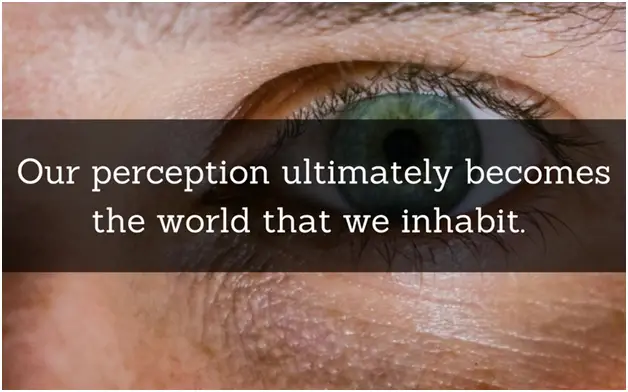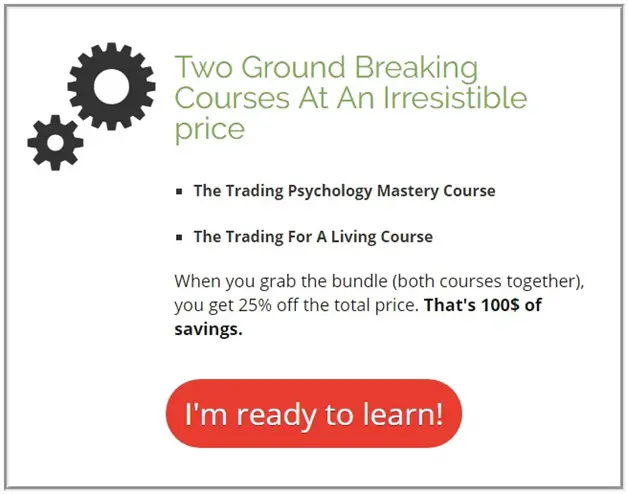This is a Guest Post by Yvan Byeagee. He is one of my personal favorite teachers of trading psychology. His website is at TradingComposure.com.
Transform Your Market Performance With This Simple Shift
It’s not the markets that throw us lemons, it’s what we do with them.
Keep this in the back of your mind.
Now imagine you wake up in the morning and you witness a huge gap down in the market, way below your stop. The gap is so large that your trading account is reduced to rubbles.
I know, pretty extreme. But I’m just trying to make a point, so bear with me.
Ok, so you’re traumatized for life!
Now imagine another trader goes through that same exact ordeal. His response, however, is almost opposite to yours. The guy (or gal) feels almost liberated by such an event and decides that this is a great chance to start anew.
Again, it’s exactly the same event, but two radically different responses.
So what’s happening there?
Essentially, here it is: Whatever happens as a matter of circumstances, our perception determines how we experience them.
The older I get, the less interested I am in investigating the events and circumstances I may find myself in, and the more interested I become in the way I perceive what has happened.
Because that is what matters in the end, it’s how we perceive things, and that perception ultimately becomes the world that we inhabit.
But let’s back up a little bit.
How does one define perception?
According to the Wikipedia, Perception (from the Latin perceptio, percipio) is “the organization, identification, and interpretation of sensory information in order to represent and understand the environment.”
In other words, when your sensory organs acquire information about the environment, this information is encoded as neural signals which travel to your brain.
The brain then seeks to see if that information is consistent with the model it has already formed of the environment. Anything that’s not similar is rejected. This process is called perception.
In the world, we are constantly bombarded with all kinds of information coming to our 5 senses. The best estimate I’ve read is that there are 6 billion bits per second worth of information available to our senses on a moment to moment basis.
The research also tells us that our brain has a limited amount of information it can perceive at a conscious level, and that number is 134 bits per seconds. That’s a big difference, isn’t it? 6 billion available to our senses and only 134 gets in (consciously).
Not surprisingly what that means is that there is a huge filtering activity going on, and so, we develop habits in the way that we think about things. We are constantly filtering information and selecting the ones that already fit our worldview.
Why? Mostly for efficiency reasons, which translates into survival.
The mind engineers its own limitations.
The existing model you hold in your mind about the world, and in the case of trading, the way you think of the market, the way you think of losses or profits, all of this is just that: it’s a model! If you prefer, it’s a representation!
You see, the way people perceive reality is subjective; it is colored by their different experiences since birth. For instance, in your childhood, if you’ve been repeatedly told that you were never good enough, you will eventually start believing it.
Later in life, many experiences might prove you otherwise, yet, when you fail at something (when you take a loss in trading, for example), that old map will still tend to color your experience of your present circumstances.
So reality (our representation of it) is going to differ from person to person, and insofar as it differs, it pinpoints the very reason why some people seem to be more positive than others, more resilient, happier, etc., etc., given the exact same circumstances.
It’s just the perception that is different because everyone has a different model of the world.
But why doesn’t the brain update the existing model, you ask?
Well, it does, but very slowly. Because the existing model often hinders any updates. Remember, the brain is constantly filtering information, whether consciously or unconsciously, and this can prevent growth.
As you see, the mind engineers its own limitations.
Seeking a different approach.
So how is that information useful, and how can you change your perception of things in a way that is unprejudiced; in a way that allows you to maximize your market (and life) experiences however they come?
The useful aspect of this is to remind yourself that what you’re thinking is only ONE option in a whole range of things that you could be thinking or doing.
In other words, there’s always a different way that you can think about something and approach it. One way that you could jolt yourself out of your habitual way of seeing things is to just ask yourself the question: What’s another way to experience this; what’s a different way of looking at it?
One thing to understand is that nothing is inherently dual; nothing is ever good or bad in a reality that is independent of human observation.
What’s more, nothing is actually happening to us, or for us. Life just happens, my friends, and everyone is experiencing things based on the mental map they hold of the world, whether that mental map is accurate and optimal, or not.
Depending on how you have acquired your mental map, you might be seeing the world in ways that are not benefiting you; in other words, through the lens of hopelessness, pessimism, jealousy, perfectionism, and the list goes on.
A little story.
There’s a nice little story which illustrates this really well, and it’s quite touching, at least, it has been to me when I first heard it.
In a class of first graders, the teacher asks, “What color are apples?”
Most of the children in the class say red or yellow, golden, green. Then a little boy raises his hand and says “white”.
The teacher looks surprised and says, “There are no white apples.” you must be thinking of something else.
But the young boy insistently says, “No, apples are white.”
And the teacher gets a little firm after a while and says, “No, that is not correct.”
Finally, the little boy says, “Well, when you cut the apple open, it’s white.”
As you see, the child has a very wonderful sense of openness to the world around him, and so he can see things differently, unconventionally.
He isn’t trapped by the habit of blind perception, so he is able to stay open to other information that comes to his senses, not just the ones he already holds about the world.
This is why two people can experience the exact same circumstance in life and take something completely different out of it.
A string of losing trades, let’s say, might make one trader an emotional mess while that very same experience can prompt another one to better himself, to improve his game.
If we can just cultivate such a little bit of openness, we might begin to experience trading differently, and even perhaps the market in unconventional ways accepting whatever it throws at you, with the intimate conviction that it’s all perception in the end.
Our own reflection.
We’re not always in control of what happens to us, in the markets or in life, and that is a fact.
You may be ‘robbed’ of hard earned profits or you may be blessed with additional gains (and some combination of the two will always happen as you keep trading).
But that’s not really the point. The point is this: If you feel like you’re constantly struggling, then you live in a world that’s all about constantly struggling.
And, if you feel like you’re constantly being blessed, then you live in a world that’s all about constantly being blessed.
What we see when we interpret our lives and the situations we find ourselves in is only ourselves. Life is a mirror that casts back to us our own reflection!
In order to update that reflection or model, to better reflect the likely state of reality, we need openness; an openness to challenge what we think we already know about the world.
Conclusion
So as you’re going around your normal trading activities today, tomorrow, or whenever, I’d like to challenge you to look deeper at your experiences.
If you experienced a loss (or a string of losses) and you feel frustrated, or upset, or discouraged, stop for a moment and think about how you could view that experience in a different way.
Now, this may not make it any different, it may not make you less angry or frustrated, but if you keep seeking for different ways of looking at things, eventually you’ll hit on something that gives you a totally new different experience of what’s going on.
And this has the power to expand your mind and cause a deep shift in the way you experience your life.
Remember, you have a choice, the trick is remembering that you have that choice and then exercising it.
Any questions? Yvan can be reached here: Trading Composure. Or here: @TradingComposur on Twitter.
Do you struggle with trading psychology? Here’s his offer to you:

